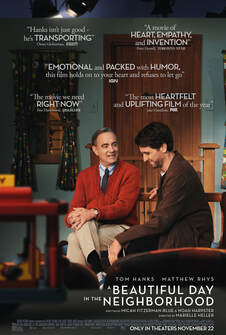
“What do you do with the mad that you feel?”
My father and I often debate the quality or meaning of various films together, spread throughout our busy film-watching lives. But when I once asked what his favourite genre was, my father responded with “true stories”, commending them for their sometimes astonishing unbelievability, capability to teach and honourable desire to correct us when we might have gone astray – often simultaneously. Marielle Heller’s A Beautiful Day in the Neighborhood easily accomplishes all of this and more, whilst artfully embodying American TV host Fred Rogers’ tender, non-judgemental convictions that were rooted in his Christian faith. In this way, Heller’s film, albeit of secular origin, becomes one of the most important ‘Christian’ films of recent years – one that, much like the teacher whom Tom Hanks portrays, aims to humbly deliver a lesson that might just save a person’s soul.
The soul in question is that of Lloyd Vogel’s (Matthew Rhys, playing a fictionalised version of journalist Tom Junod), a cynical, albeit talented investigative journalist who is tasked with writing a profile on the beloved, children’s television show host, Mr. Rogers (Tom Hanks). He immediately protests, sharply informing his editor “I don’t write puff pieces”. Naturally, he has no say in the matter and begrudgingly makes his way from the bustle of New York City to the quieter Pittsburgh, to interview Rogers. It’s there that Vogel encounters a person quite unlike any other, one whom you could either class as a fraud, or a “living saint” (although the latter term is one Rogers strongly disliked). In the process of interviewing Rogers, the roles of interviewer and interviewee soon reverse – much to Lloyd’s initial bewilderment. Their series of conversations, however brief, become unexpectedly therapeutic, bringing to light Lloyd’s internal, emotional pain and inability to forgive his father, Jerry (Chris Cooper).

It is Rogers, however, who initiates this movement towards depth of conversation, and in so doing, chooses to draw close to Vogel – both literally and figuratively. In spite of a very busy schedule, Rogers makes time to specifically sit, listen and talk with him. He shows a keen interest in who he is, his family and his pain – all the while saying very little. It naturally takes a few meetings for Vogel to feel comfortable being the one doing all the talking (especially when he usually does very little of it), but he eventually comes to understand what Rogers is all about, embodied in one simple, quiet line of dialogue: “You love broken people, like me”.
It would be easy to select a handful of moments from within the film and call them heart-breaking, but Vogel’s moment of realisation and Rogers’ calm, measured response, genuinely is. It’s here that Rogers responds, just as God would, in seeking to comfort the broken-hearted Vogel, by affirming the good that is within him and being lovingly present to him in that moment. Unexpectedly, Vogel accepts these affirmations and even chooses to open himself up to receive a challenge. The moment reminded me, almost immediately, of a Psalm of David:
he rescues those whose spirits are crushed.”
(Psalm 34:18, NLT)
disciples, if you have love for one another.”
(John 13:35, ESV)
put a new spirit in you. I will take out your stony,
stubborn heart and give you a tender, responsive heart.”
(Ezekiel 36:26, NLT)
Prior to watching the film for yourself, however, why not pray for God to speak to you throughout the film and if you feel comfortable, pray this prayer over this and all of your future, film-watching experiences:
Dear Lord,
As I watch this film, I ask that you would be present here with me. Highlight to me anything within it that is honourable, anything that can be used in conversation for your Kingdom purposes. Amen.
A Beautiful Day in the Neighborhood is now available to own on DVD & Blu-Ray

 RSS Feed
RSS Feed